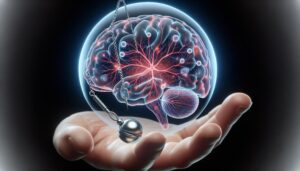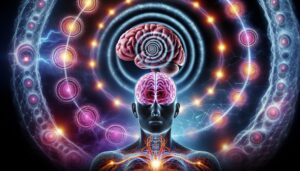
Using Hypnosis to Cope With Neuropathy
In the challenging landscape of neuropathy management, a novel approach is gaining noteworthy attention – hypnosis. Characterized by damaged or dysfunctional nerves causing persistent pain, neuropathy frequently resists traditional treatment methods, necessitating exploration of alternative solutions.
Hypnosis, once primarily associated with relaxation and stress relief, now shows promising potential in managing such chronic pain conditions. This intervention, devoid of pharmacological side effects, offers a unique avenue for modulating pain perception, providing significant relief for many.
This discourse aims to illuminate the efficacy and implications of hypnosis in neuropathy management, inviting you to explore this fascinating and emerging field.
Understanding Neuropathic Pain
 Neuropathic pain, a debilitating condition affecting 3-17% of the general population, presents unique challenges in terms of diagnosis and treatment, often necessitating an exploration of non-conventional methods such as hypnosis. This type of pain arises from a malfunction in the nervous system and is significantly different from nociceptive pain, which is a direct response to tissue damage. Understanding the complex neuropathic pain mechanisms is crucial in devising effective treatment strategies.
Neuropathic pain, a debilitating condition affecting 3-17% of the general population, presents unique challenges in terms of diagnosis and treatment, often necessitating an exploration of non-conventional methods such as hypnosis. This type of pain arises from a malfunction in the nervous system and is significantly different from nociceptive pain, which is a direct response to tissue damage. Understanding the complex neuropathic pain mechanisms is crucial in devising effective treatment strategies.
The impact of neuropathic pain is far-reaching, often leading to reduced quality of life due to persistent pain, sleep disturbances, and diminished physical and social functionality. Given the limited efficacy and potential side-effects of conventional pharmacological treatments, there is a growing interest in alternative therapies. Hypnosis, in particular, has shown promising results. It can alter the perception of pain, providing relief where other treatments may have failed.
Hypnosis efficacy in managing neuropathic pain is backed by scientific research. It works by modulating pain perception, transforming the way the brain interprets pain signals. This mind-body approach to pain management offers hope for those suffering from this challenging condition, underscoring the need for further research and wider recognition of hypnosis as a viable treatment option.
Current Treatments and Their Limitations
 While hypnosis emerges as a promising alternative, it’s important to acknowledge the limitations and challenges posed by current treatments for neuropathic pain. Traditional therapeutic approaches primarily focus on pharmacological interventions, often having limited success in fully alleviating pain and sometimes causing significant side-effects.
While hypnosis emerges as a promising alternative, it’s important to acknowledge the limitations and challenges posed by current treatments for neuropathic pain. Traditional therapeutic approaches primarily focus on pharmacological interventions, often having limited success in fully alleviating pain and sometimes causing significant side-effects.
In addition, pain modulation is a complex process involving multiple neural pathways, making it difficult to develop a one-size-fits-all treatment.
- Current treatments may not effectively address all affected neural pathways, leading to only partial relief.
- The long-term use of medications can lead to dependency and other health issues.
- Some therapeutic approaches may not adequately address the psychological impact of chronic pain.
- Cognitive strategies to manage pain require significant patient effort and ongoing support, which may not always be available.
Moreover, the psychological impact of living with chronic pain is often overlooked in treatment plans. Emphasizing cognitive strategies, such as mindfulness and cognitive-behavioral therapy, can equip patients with tools to manage their pain better but require substantial commitment and professional guidance.
Hypnosis as an Alternative Therapy
 In the quest for more effective and holistic treatment options, hypnosis is emerging as a promising alternative therapy for managing neuropathic pain. One of the key hypnosis benefits is its capacity to alter pain perception. Through guided relaxation and focused attention, hypnosis can help patients to perceive pain differently, reducing its intensity and providing much-needed neuropathic relief.
In the quest for more effective and holistic treatment options, hypnosis is emerging as a promising alternative therapy for managing neuropathic pain. One of the key hypnosis benefits is its capacity to alter pain perception. Through guided relaxation and focused attention, hypnosis can help patients to perceive pain differently, reducing its intensity and providing much-needed neuropathic relief.
Further, hypnosis offers effective coping strategies for neuropathic pain sufferers. It provides the tools to manage and reduce pain, fostering a sense of control and empowerment in patients. Utilizing hypnosis can help to reduce reliance on medications, potentially reducing side effects and enhancing overall health.
Moreover, hypnosis supports emotional healing, a critical component often overlooked in traditional pain management approaches. By addressing the emotional impact of chronic pain, hypnosis not only alleviates physical discomfort but also fosters mental well-being, further enhancing its therapeutic value.
Hypnotic Techniques for Pain Management
 Harnessing the power of the subconscious mind, hypnotic techniques offer innovative approaches to neuropathic pain management. These techniques utilize the mind-body connection, altering pain perception and providing relief.
Harnessing the power of the subconscious mind, hypnotic techniques offer innovative approaches to neuropathic pain management. These techniques utilize the mind-body connection, altering pain perception and providing relief.
Hypnosis effectiveness in managing neuropathic pain is supported by scientific evidence. It works by redirecting the focus of the mind, thus changing how individuals perceive pain. Crucially, hypnosis also offers emotional management benefits. By addressing the emotional aspect of pain, hypnosis helps individuals cope better with their condition.
Additionally, hypnosis provides stress relief, a critical component in managing pain. By reducing stress, the body can better focus on healing itself, further enhancing the mind-body connection.
To summarize, hypnotic techniques for pain management:
- Leverage the mind-body connection to alter pain perception
- Provide emotional management tools for better coping
- Offer stress relief, promoting overall wellbeing
- Proven effectiveness in managing neuropathic pain
Hypnosis and Patient’s Pain Perception
 Understanding the role of hypnosis in a patient’s perception of pain is crucial in determining its efficacy as a non-pharmacological intervention for chronic pain management. Hypnosis works by altering the patient’s pain perception, thereby tapping into the mind-body connection. This altered state, known as the trance state, enables the patient to focus on positive thoughts and feelings, diverting attention from the pain.
Understanding the role of hypnosis in a patient’s perception of pain is crucial in determining its efficacy as a non-pharmacological intervention for chronic pain management. Hypnosis works by altering the patient’s pain perception, thereby tapping into the mind-body connection. This altered state, known as the trance state, enables the patient to focus on positive thoughts and feelings, diverting attention from the pain.
Hypnosis not only offers physical relief but also plays a significant role in emotional management. Chronic pain often triggers feelings of stress and anxiety, exacerbating the pain experienced. Hypnosis assists in managing these emotions, providing much-needed stress relief and promoting overall well-being.
In the trance state, patients can visualize themselves in a pain-free state, which in turn may alter the brain’s interpretation of pain signals. This shift in perception can result in a significant reduction in the pain experienced. Hypnosis thus offers a promising approach to pain management – one that empowers patients to take control of their pain perception and, potentially, their quality of life.
Case Studies on Hypnosis and Neuropathy
 Several case studies have been conducted to evaluate the effectiveness of hypnosis in managing neuropathic pain, offering compelling insights into this innovative approach. These studies have explored the potential of hypnosis as a powerful tool in altering pain perception, thereby significantly improving patient outcomes.
Several case studies have been conducted to evaluate the effectiveness of hypnosis in managing neuropathic pain, offering compelling insights into this innovative approach. These studies have explored the potential of hypnosis as a powerful tool in altering pain perception, thereby significantly improving patient outcomes.
For instance, one case study highlighted a patient with severe diabetic neuropathy who reported substantial pain relief following hypnosis therapy. This case, among others, emphasizes the potential for hypnosis to be utilized as a beneficial alternative therapy option, particularly for patients who have found little relief in traditional treatments.
In these studies, the following observations were made: – Consistent reduction in pain intensity post-hypnosis treatment. – Improved overall quality of life due to better pain management. – Increased patient compliance and engagement in treatment. – Positive emotional and psychological effects contributing to pain relief.
These case studies mark a significant stride in understanding the potential of hypnosis as a valid and effective therapeutic intervention for neuropathic pain. Further research is required to validate these findings and establish standardized protocols for the application of hypnosis in a clinical setting.
Benefits and Limitations of Hypnosis
 While hypnosis offers a multitude of benefits in managing neuropathic pain, it is imperative to equally consider its limitations to fully understand its role in therapeutic intervention. This technique can significantly alter pain perception, providing a respite from chronic discomfort. It provides cognitive benefits by helping patients to reframe their understanding of pain, potentially lessening its intensity.
While hypnosis offers a multitude of benefits in managing neuropathic pain, it is imperative to equally consider its limitations to fully understand its role in therapeutic intervention. This technique can significantly alter pain perception, providing a respite from chronic discomfort. It provides cognitive benefits by helping patients to reframe their understanding of pain, potentially lessening its intensity.
Evidence shows that hypnosis encourages the mind-body connection, using the power of suggestion to promote healing and pain reduction. Emotional relief is another notable benefit, as hypnosis can aid in stress management, which is often a contributing factor to exacerbated pain. However, the efficacy of this treatment can vary between individuals. Some may find significant relief, while others experience minimal changes in their symptoms.
Certain limitations of hypnosis as a treatment strategy must be acknowledged. It requires a willingness to participate and a belief in its potential effectiveness. Furthermore, it is not a quick fix and requires repeated sessions over time. Hypnosis should be viewed as a tool that can complement other forms of treatment rather than a standalone solution. Its potential, however, is undeniable and warrants further exploration in neuropathic pain management.
Future Research Directions in Hypnosis for Neuropathy
 Given the promising potential of hypnosis in managing neuropathic pain, there is an imminent need for further research to elucidate its underlying mechanisms and optimize its therapeutic application. Hypnosis, as a psychological intervention, has been shown to be effective in modulating pain and inducing neuroplastic changes. However, a comprehensive understanding of the neuropathic pain mechanisms influenced by hypnosis remains underexplored.
Given the promising potential of hypnosis in managing neuropathic pain, there is an imminent need for further research to elucidate its underlying mechanisms and optimize its therapeutic application. Hypnosis, as a psychological intervention, has been shown to be effective in modulating pain and inducing neuroplastic changes. However, a comprehensive understanding of the neuropathic pain mechanisms influenced by hypnosis remains underexplored.
Further research could be steered in the following directions:
- Delve deeper into the neuropathic pain mechanisms influenced by hypnosis.
- Establish standardized protocols to measure hypnosis effectiveness in various neuropathic conditions.
- Investigate the role of psychological interventions, including hypnosis, in pain modulation.
- Examine neuroplastic changes induced by hypnosis and their impact on neuropathic pain management.
These investigations could offer valuable insights to enhance the application of hypnosis in neuropathic pain management and contribute to the development of more effective, patient-centered therapeutic strategies. This approach aligns with the commitment to serving others by exploring innovative, non-pharmacological methods to alleviate suffering from neuropathic pain. Through these research directions, the full therapeutic potential of hypnosis can be harnessed to address the complex challenges posed by neuropathic pain.
Frequently Asked Questions

What Are the Potential Side Effects or Risks Associated With Using Hypnosis for Neuropathy Pain Management?
While hypnosis can provide relief for neuropathy pain, limitations include its varying duration of effectiveness and suitability for all patients. Misconceptions about hypnosis may also deter some from this treatment, despite a proper neuropathy diagnosis.
How Quickly Can Patients Typically Expect to See an Improvement in Their Pain Levels When Using Hypnosis as a Treatment?
Patients’ improvement in pain levels through hypnosis can vary based on neuropathy severity, patient eligibility, and hypnosis preparation. However, significant relief is often observed after eight or more sessions utilizing specific hypnosis techniques.
Are There Certain Types of Neuropathic Pain That Respond Better to Hypnosis Than Others?
Hypnosis techniques vary in effectiveness for different neuropathy causes. Patient experiences suggest that hypnosis can be particularly beneficial for pain associated with diabetes or shingles. However, more research is needed to confirm these findings.
Can Hypnosis Be Effectively Combined With Other Treatments for Neuropathy, Like Medication or Physical Therapy?
Hypnosis can effectively complement neuropathy treatments like medication or physical therapy. Improving accessibility and affordability of hypnosis, patient readiness, and dispelling misconceptions can promote its use in neuropathic symptoms alleviation.
How Can a Patient Find a Qualified Professional to Administer Hypnosis for Neuropathy Pain Management?
Patients seeking neuropathy pain management through hypnosis should consult with certified hypnosis specialists. These professionals can effectively use hypnosis to alter pain perception, while dispelling common misconceptions and preparing patients for successful treatment.
Conclusion
In conclusion, hypnosis emerges as an innovative, promising tool for managing neuropathic pain. Its ability to alter pain perception and alleviate distress is compelling, despite the limitations.
The irony lies in the metamorphosis of hypnosis, from a tool of entertainment to a serious contender in pain management strategies.
Further exploration and research into this non-pharmacological intervention could potentially revolutionize neuropathic pain management, presenting an intriguing avenue for future studies.
Visit Bohol Hypnosis Expert or The Hypnotist Asia for further information . Contact Mark E Wilkins for appointment.




